Tulane’s Stone Center receives $1.3 million from Zemurray Foundation for the study of Latin American indigenous languages, art
Reaffirming its nearly century-long commitment to Latin American studies at Tulane, the Zemurray Foundation of New Orleans has donated $1.3 million to the Roger Thayer Stone Center for Latin American Studies, establishing two endowments that will support the study of the region’s indigenous languages and art history.
The $1.3 million gift includes an $800,000 endowment creating the Doris Z. Stone Indigenous Languages of Latin America Endowed Fund. The fund will assist students and faculty in studying, teaching, and researching languages originating in Central and South America and the Caribbean. Knowledge of these languages is essential to the work of many Latin American scholars across various disciplines, including anthropology, history and linguistics.
The fund is named for the renowned Tulane-affiliated ethnographer and archaeologist Doris Zemurray Stone (1909-94), who championed the preservation of indigenous Mesoamerican languages during her multifaceted career. The Stone Center bears the name of her late husband, Roger Thayer Stone. Doris Zemurray Stone was also the daughter of Board of Tulane trustee Samuel Zemurray, who helped launch Latin American studies at Tulane in 1924.
The Zemurray Foundation gift also included $500,000 to establish the Elizabeth Hill Boone Program for Scholarly Research in the Art, Ethnohistory, and Culture of Pre-Columbian and Colonial Latin America Endowed Fund.
Named in honor of the Tulane professor emerita and pre-eminent art historian, Elizabeth Hill Boone, the fund will benefit the Stone Center and the Newcomb Art Department by advancing programming in Boone’s academic specialties. The funding will support visiting professors, lecture series, scholarly collaborations and more.
A member of the Tulane faculty since 1995, Boone is a leader in the field of pre-Columbian art history, with a particular focus on pictography. An author and editor of numerous books and articles, she is a fellow of the American Academy of Arts and Sciences and a corresponding member of the Academia Mexicana de la Historia. Among her many honors, she received the Research Hall of Fame Award from Tulane in 2021.
“The Zemurray Foundation’s vision and commitment to Latin American studies have made Tulane a leader in the study of this essential and fascinating part of the world for nearly 100 years,” Tulane President Michael Fitts said. “The Stone Center’s multidisciplinary work continues to expand our understanding of Latin America and its cultural and historical richness while strengthening our relationships with the diverse nations and peoples who comprise it. I’m tremendously grateful to the Zemurray Foundation for its major role in ensuring the Stone Center’s place as one of the world’s leading academic hubs of Latin American studies.”
The Stone Center’s executive director, Thomas Reese, said the new funds will help make its acclaimed programs in indigenous languages and art even better.
“These two generous endowments support two pioneering areas of teaching, in which Tulane University first launched internationally recognized programs with the appointments of Mayan linguist Alfredo Barrera Vásquez in 1950 and art historian Donald Robertson in 1957,” said Reese, who also holds the Thomas F. and Carol Reese Distinguished Chair in Latin American Studies. “They are a testament to the Zemurray Foundation’s long commitment to Tulane continuing to be a place where students and scholars come to advance research and knowledge about indigenous cultures and languages in Latin America.”
The Stone Center coordinates the research and teaching activities of more than 70 core faculty and 35 affiliated faculty and adjuncts in schools and departments across several Tulane campuses. In 2024, Tulane will celebrate a century of Latin American studies at the university, which began with Samuel Zemurray’s 1924 gift to endow the Department of Middle American Research, known today as the Middle American Research Institute.

